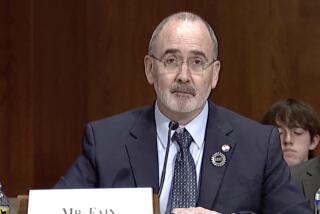Wrong in Wisconsin
The firestorm ignited in Wisconsin over public employee unions is now spreading to Indiana and Ohio, and will probably spark elsewhere before it’s extinguished. As union members man the barricades to protest efforts to strip them of collective bargaining rights, Democratic lawmakers flee their home states to forestall action and conservatives vow to prevent unions from sucking government treasuries dry, what’s striking about the debate is how little the opposing sides seem to understand or acknowledge each other’s arguments. Wisconsin’s approach to unions is decidedly the wrong one, but that doesn’t mean the status quo is sustainable.
Wisconsin Gov. Scott Walker’s claim that public employee unions must be crushed in order to balance the state’s budget is deeply disingenuous. Though it’s true that raising workers’ pension and healthcare contributions would help reduce the state’s $3.6-billion shortfall, that’s no reason to take away collective bargaining rights on such benefits in perpetuity. Unions have curbed worker exploitation, raised living standards and reduced the gap between rich and poor nationwide, and benefits wrested by unions after long struggle are now enjoyed and taken for granted by Americans from all walks of life. Moreover, it’s no fault of Wisconsin’s teachers and other state workers that past administrations have awarded overly generous contracts.
At the same time, though, union backers seldom acknowledge that there are important differences between public employee and private-sector unions that render the former more troublesome. The biggest is that when companies can no longer afford the benefits they’ve given to their workers, they can file for bankruptcy protection and terminate their union contracts, negotiating new ones that allow them (and the jobs they provide) to survive. State governments don’t have that luxury; to meet rising labor commitments, they must continue to raise taxes or cut services. Further, private-sector contract negotiations are by their nature adversarial, with one side representing workers and the other representing managers who are deeply concerned with protecting profits. When it comes to government labor contracts, all too often union representatives are negotiating with politicians who owe their jobs to union backing and who are spending money that isn’t theirs. What’s more, approving an unsustainable pension deal comes with little political cost, because by the time it starts dragging the state into the red, the officials who approved it have left office.
This is why states all over the country, including California, are wrestling with unaffordable public pension obligations. But there are better ways of solving this problem than stripping unions of collective bargaining rights. If politicians can’t be trusted to represent taxpayer interests in contract talks, maybe states could appoint independent expert panels to do the job, rather like the compensation committees that set CEO pay at some corporations. Or labor union influence over elections could be curbed. But the easiest thing would be to simply renegotiate separate contracts for newly hired workers. Indeed, Wisconsin’s unions have shown every sign that they’re willing to make sacrifices, if Republican leaders would listen.
More to Read
A cure for the common opinion
Get thought-provoking perspectives with our weekly newsletter.
You may occasionally receive promotional content from the Los Angeles Times.






